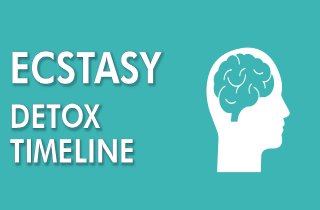ARTICLE OVERVIEW: You are less likely to develop physical dependence on ecstasy than other drugs. Still, anytime you come down off of MDMA, it’s like a mini detox. Here, we review how long detox typically lasts and what can be expected during and after. At the end, we invite your questions and comments about ecstasy detox. In fact, we will try to respond to all legitimate questions with a personal reply.
TABLE OF CONTENTS
- Who Needs Detox
- Withdrawal
- Duration
- Common Symptoms
- Protracted Symptoms
- Tapering
- Medications That Help
- Detox At Home?
- Safety
- Signs Of A Drug Problem
Who Needs Detox?
Ecstasy is an empathogenic drug used for its ability to produce altered states of consciousness. Its primary ingredient is MDMA, or 4-methylenedioxy-methamphetamine a synthetic psychoactive drug of the amphetamine class of drugs, first synthetized in 1912. Thought to be first marketed as an appetite inhibitor, MDMA has been used in past decades in research on human empathy, as a treatment for PTSD, and even as an antidepressant.
Ecstasy mainly works by releasing large amounts of serotonin. This “feel good” neurotransmitter floods the synapses of the brain leading to rushes of empathetic feeling. However, the brain also becomes significantly depleted of this important neurotransmitter, contributing to the negative psychological after effects that people may experience for several days after taking MDMA. [1]
- Have you used ecstasy on weekends over a period of 3 months or more?
- Have you experienced any unwanted effect after using MDMA?
- Have you grown accustomed to the effects of MDMA?
If you find yourself answering: “YES”, to any of these questions you may want to consider detoxing your body from the drug toxins found in ecstasy, and we strongly recommend you continue reading for processes and protocol. While ecstasy use rarely triggers physical dependence, there are some cases wherein folks can benefit from time off…or even tapering doses. But first, why even consider a detox?
What Is Withdrawal?
Technically, anytime that you take ecstasy, the buzz-kill you feel afterward is a kind of withdrawal. However, it’s a little known fact that MDMA can cause both longer-term physical and psychological dependence.
Data from both humans and animals studies suggest that regular MDMA use produces adaptations in the serotonin and dopamine systems that are associated with substance use disorder and related behaviors, such as increased impulsivity. In addition, some people who use MDMA report symptoms of addiction, including:
- Continued use despite negative physical or psychological consequences.
- Craving.
- Tolerance.
- Withdrawal.
However, expert opinion regarding the possibility of developing physical dependence on MDMA varies. In fact, self-reports of a true ecstasy withdrawal syndrome are few and far between. Most users take ecstasy only occasionally, which makes it less likely that the brain requires structural or functional adaptation. Still, users can get physically dependent on the amphetamines combined with MDMA, which can lead to physical cravings upon cessation. [2]
Duration
The duration of acute ecstasy withdrawal symptoms will depend upon a number of factors including:
- The person’s level of use.
- How long s/he has been abusing ecstasy.
- If s/he has been taking other drugs along with ecstasy.
It takes between 2-4 days for the body to get rid of toxins found in ecstasy; this is why physical stability can be reached within a short period of time. However, the time it takes for the withdrawal symptoms to subside is variable. Further, it may take longer for psychological withdrawal symptoms to subside. For example, some symptoms can persist for weeks and months after cessation.
For a full list of symptoms and when they appear, see this Addiction Blog ecstasy withdrawal timeline chart.
Common Symptoms
Ecstasy withdrawal syndrome has not been demonstrated nor recorded in scientific literature. In other words, long-term physical dependence on ecstasy and accompanying withdrawal symptoms are rare. Still, when you notice that the “come down” period is worsened…this can be a sign that you are becoming physically dependent on ecstasy.
As reported by the National Institute on Drug Abuse, some users experience unpleasant withdrawal symptoms after regular (daily or almost daily) use of the drug is reduced or stopped. The most common symptoms include traits such as [3]:
- Depression
- Fatigue
- Loss of appetite
- Trouble concentrating
Furthermore, acute MDMA detox happens anytime you take ecstasy. It is usually completed within the first 72 to 96 hours, making this period for recovery. During acute detox, the individual experiences a number of withdrawal symptoms since the body reacts to the absence of the drug. The most common ecstasy detox symptoms that can occur when MDMA leaves the system, are:
- Blurred vision
- Chills
- Constipation
- Depression
- Faintness/fatigue (physical and mental)
- Insomnia
- Involuntary teeth clenching
- Loss of appetite
- Muscle tension and muscle cramps predominantly in the chewing muscle
- Nausea
- Sweating
- Tremors
- trouble concentrating
Once the toxins are out of the system, the physical symptoms are considerably reduced. However, heavy users will experience these symptoms much more intensely and may re-administer ecstasy at this point so as to avoid the discomfort. In addition, people who maintain high doses use of MDMA may present problems with the body´s ability to regulate its own temperature, resulting in a sharp increase in body temperature (hyperthermia), leading to liver, kidney, and cardiovascular failure.
It is of crucial importance to rest and stay hydrated during the first 72 hours after taking ecstasy. Severe dehydration can result from the combination of the drug’s effects and the crowded and hot conditions in which the drug is often taken.
Protracted Symptoms
A “protracted symptom” is a symptom that last for the duration of weeks or months after use. One of the most common protracted withdrawal symptoms is depression. A person may start to experience depressive thoughts after using MDMA for weeks or months, which is sometimes resistant to any treatment other than antidepressant medications like selective serotonin reuptake inhibitor.
Another likely protracted symptom is the compulsion to use ecstasy again. This can happen when a stressful situation arises or during a party when someone offers a pill, even though the person is clear of drug for some time. Being more of a mentally than a physically addictive drug, some users may need cognitive-behavioral therapy to help them overcome obsessive thinking about ecstasy.
What are some other protracted withdrawal symptoms?
Other people may experience a loss of appetite. Some report feeling anxious and confused. Still other people who take MDMA regularly have also reported a lack of motivation or impairment of decision-making, information processing, logical reasoning and simple problem solving.
Other protracted symptoms of ecstasy detox include:
- Depersonalization
- Flashbacks and even psychotic episodes
- Hallucinations
- Impairment of memory, both verbal and visual
- Greater impulsivity and lack of self-control
- Panic attacks
- Recurrent paranoia
… as well as hypokinetic or hyperkinetic disorders including parkinsonism, tremor, dyskinesias, and myoclonus (strange and involuntary movements).
Studies suggest chronic use of MDMA can produce damage to the serotonin system. It is ironic that a drug that is taken to increase pleasure may cause damage that reduces a person’s ability to feel pleasure. This especially applies to heavy and long-term users, while occasional ones may not feel any of the above-mentioned. Although there are conflicting theories concerning the mechanism of how is toxic to neurons, it is clearly related to the excessive metabolic activity and neurotransmitter release in the serotonergic and, possibly, the dopaminergic neurons.
While the physical symptoms of ecstasy dependence usually subside quickly, some of these psychological symptoms could trigger relapse making it important to stay surrounded with close and sober people and/or seek counseling. Avoiding people who take ecstasy and places where it is being taken is necessary, it is very important to stay at a safe environment among sober people and avoid situations that could trigger cravings for ecstasy. A person who has been addicted to the effects of ecstasy may fall into the trap of relapse, especially if they encounter stressful situations.
Tapering
Most people who are long-term or heavy users of ecstasy will need to seek medical advice when considering coming off MDMA for good. Each case is different. Further, some people may benefit from slow withdrawal protocols while others may be prescribed antidepressants during detox.
Medications That Help
Although there are currently a number of medication targets that show promise in animal models and in some eary clinical trials, there are currently no FDA-approved medications to treat MDMA use disorder. Nevertheless, there are medications to treat the symptoms caused by the use and abuse of this drug.
For example, treatment with SSRIs (Selective Inhibitors of Serotonin Reuptake) and / or mirtazapine, may be recommended for six months or until the disappearance of the symptomatology. In any case, a medical doctor´s help should always be included in cases of ecstasy detox. Do not try medicating yourself or detoxing on your own!
Detox At Home?
So, can you detox from ecstasy at home?
No, it´s not recommended. Counseling is often very helpful for chronic or heavy users in easing the process of quitting. Talk therapy centers around modifying behavior by teaching techniques to deal with cravings. It is likely that people with addictive personalities reach for other chemical substances or alcohol, making it crucial to stay at a safe environment.
Safety
MDMA is potentially dangerous, even in the doses typically used by participants at raves. Both the acute and the chronic effects can lead to serious and even fatal toxicity, the full extent of which cannot yet be estimated with accuracy.
Relapse is always a risk, safety depends on how you deal with the psychological dependence to the drug and this is directly related on how hard your MDMA use was in your life, this is why we strongly recommend looking for help in counseling groups, and avoiding places where you´ll feel tempted to use the drug.
Signs of a Drug Problem
While many would claim that there is no possibility to develop an addiction to ecstasy, the habit to compulsively use ecstasy can certainly make one dependent on the drug effect. Moreover, while symptoms of withdrawal tend to be mild compared to other narcotics, they do exist. In fact, some people who use MDMA report symptoms of addiction. The main signs of a problem are:
- Continued use despite health problems or problems at home/work/school.
- Loss of control of drug use.
- Quitting but not being able to stay quit.
If you or someone you know have been taking ecstasy but do not feel like quitting yet, we encourage you to learn more about what MDMA does to your brain and body. Even though ecstasy is usually out of the system within few days, there is a possibility for protracted withdrawal symptoms last for many months after cessation.
Furthermore, treatment works!
If you think you have a problem with ecsasy, you probably do. What can you do about it? First, admit that you need help. Then, we suggest that you follow up with a medical professional. No need for shame. Drug problems are medical problems. So, seek help with any one of these professionals:
- An addiction doctor
- An addiction treatment center
- A psychologist
- A psychiatrist
- Your family doctor or general physician
Get Personalized Addiction Treatment Text Support
Receive 24/7 text support right away and at your convenience. There is no obligation to enter treatment and you can opt out at any time.
- Resources about addiction and recovery
- Information about our treatment process
Your Questions
Have you perhaps experiences to share about detoxing from ecstasy and would like to add something? Write us in the comment section below and we try will get back to you ASAP. In fact, we try to respond to all legitimate questions or concerns or will refer you to someone who can help.
Do you have any questions about scheduling an ecstasy detox? You are not alone, we can help you overcome your drug problem, but the first step you must give is to accept there is a problem; we will accompany you all the way.











Related Posts